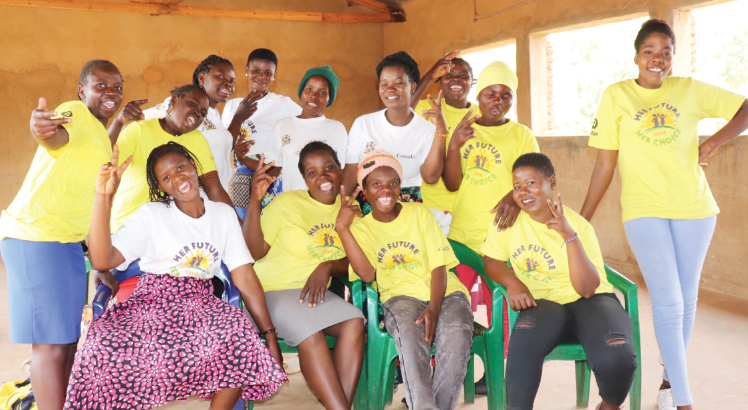S
exually active young Malawians find it tricky to talk about sex and reproductive health issues, with some shunning life-saving services for fear of being spotted by their guardians, neighbours and relatives.
To beat the barrier, service providers are putting sexual and reproductive health (SRH)supplies and information in youthful hands that privately distribute them to peers.
The peer-to-peer approach is credited with increasing SRH awareness while reducing the risk of unintended pregnancies, early marriages, school dropout and sexually transmitted infections, including HIV.
Eliza Chisamba, 23, has become a go-to person for the youth in Traditional Authority Malili on the outskirts of Lilongwe City.
A beacon of hope and determination, the peer educator is breaking the mound by sharing SRH information and condoms with sexually active boys and girls in her community.
Peer educators (in yellow and white) pose after a day-long meeting
Chisamba sounds undeterred by insults and skepticism in the rural community where many grow up hearing that contraceptives are meant for adults and married couples.
“I am on a mission to safeguard my peers from preventable perils such as unwanted pregnancies and STIs, which negatively affect their health, productivity and chances in life,” she states.
Chisamba is a peer educator under the Her Future Her Choice Project by Oxfam in Malawi in partnership with Point of Progress and the Family Planning Association of Malawi (Fpam) with funding from Global Affairs Canada through Oxfam Canada.
The five-year initiative, which phases out this year, targets 20 000 young men and women aged 10 to 24 years in Lilongwe and Balaka.
With zeal, Chisamba reaches out to over 100 peers in five villages.
“I distribute more than 500 condoms each month, saving the youth from unwanted pregnancies, HIV and other dangers likely to push them to quit school and marry too young,” she says.
In her line of duty, she endures insults to serve the population with a huge unmet demand for SRH services.
The young woman on the move dispels myths and misconceptions about contraceptives.
She narrates: “Some call me a prostitute and accuse me of recruiting my peers, but they forget that the boys and girls I go to are already sexually active.
“Others sneer at me, saying the contraceptives will make girls barren. But this is unsubstantiated.”
Apart from distributing condoms and contraceptive pills from the nearest public facilities, the peer educators establish youth clubs, counsel their peers and encourage them to seek medical treatment when they contract STIs.
Malili Youth Network chairperson Ellen Chimtengo says the demand for SRH services and rights has led to reductions in teen pregnancies and child marriages, meaning more girls are likely to complete their education.
“The project’s impact extends beyond the clubs as individual members have become foot soldiers in the fight against gender-based violence, including early pregnancy and marriages, in their communities,” she explains.
Chimtengo’s network is an umbrella of 24 youth clubs that reach more than 2 000 members across T/A Malili .
“We want to reach out to more, but there are mobility challenges,” she says. “We travel long distances and the bicycles provided by the project cannot take us to some places that require a motorcycle,” she says.
The non-governmental organisations are implementing the project together with the Ministry of Health and other relevant government institutions.
Mary Chirambo, who coordinates family planning interventions at Lilongwe District Health Office, says the project has helped the target community accept contraceptives as vital tools to keep girls in school.
“Working with peer educators and community-based distributors has proven to be a success in offering communities SRH supplies, the right information and demystifying myths and misconceptions,” she says.
Group village head Mbilizi said before the project, most men could not allow girls and women to take contraceptives.
“A woman could not access contraceptives without a man’s consent though many men had the misconception that family planning affects their performance in bed,” says the traditional leader.
Periodically, community health worker Lucy Kalipeni joins the peer educators in raising awareness and administering modern family planning methods such as injections and implants.
“Everywhere we go, the demand is growing,” she says.
Point of Progress project manager Sekanawo Mwatibu says the project has improved the uptake of contraceptives, economic empowerment of youth and community attitudes to SRH services and rights.
“Apart from a marked improvement in community attitudes and knowledge, there is rising widespread support for women’s rights and SRH rights from men, boys, community influencers and chiefs,” said Mwatibu.
Despite the successes, challenges persist.
These include commodity stockouts in public facilities and ingrained negative social norms.
These contribute to undesirable outcomes such as rampant teen pregnancy and child marriages.
Although the Constitution outlaws sex and marriage with persons aged below 18, the Malawi Demographic and Health Survey shows that 46 percent of women marry before their 18th birthday and 29 percent become mothers before reaching 19.
These fuel school dropouts, maternal deaths, STIs, HIV infections and poverty.
The inroads by Chisamba and her colleagues personify the transformative power of peer-to-peer outreach in communities where discussing sex and SRH rights was taboo.
The post Taking SRH to peers first appeared on The Nation Online.
The post Taking SRH to peers appeared first on The Nation Online.
 Moni Malawi
Moni Malawi 

